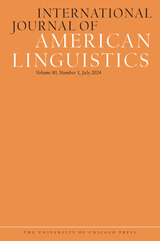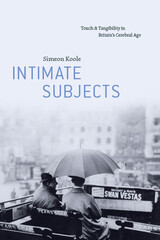101 books about Grammar & Punctuation and 9
start with C
101 books about Grammar & Punctuation and 9
101 books about Grammar & Punctuation
9 start with C start with C
9 start with C start with C
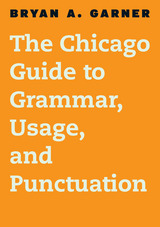
The Chicago Guide to Grammar, Usage, and Punctuation
Bryan A. Garner
University of Chicago Press, 2016
Few people can write on the English language with the authority of Bryan A. Garner. The author of The Chicago Manual of Style’s popular “Grammar and Usage” chapter, Garner explains the vagaries of English with absolute precision and utmost clarity. With The Chicago Guide to Grammar, Usage, and Punctuation, he has written the definitive guide for writers who want their prose to be both memorable and correct.
Throughout the book Garner describes standard literary English—the forms that mark writers and speakers as educated users of the language. He also offers historical context for understanding the development of these forms. The section on grammar explains how the canonical parts of speech came to be identified, while the section on syntax covers the nuances of sentence patterns as well as both traditional sentence diagramming and transformational grammar. The usage section provides an unprecedented trove of empirical evidence in the form of Google Ngrams, diagrams that illustrate the changing prevalence of specific terms over decades and even centuries of English literature. Garner also treats punctuation and word formation, and concludes the book with an exhaustive glossary of grammatical terms and a bibliography of suggested further reading and references.
The Chicago Guide to Grammar, Usage, and Punctuation is a magisterial work, the culmination of Garner’s lifelong study of the English language. The result is a landmark resource that will offer clear guidelines to students, writers, and editors alike.
Throughout the book Garner describes standard literary English—the forms that mark writers and speakers as educated users of the language. He also offers historical context for understanding the development of these forms. The section on grammar explains how the canonical parts of speech came to be identified, while the section on syntax covers the nuances of sentence patterns as well as both traditional sentence diagramming and transformational grammar. The usage section provides an unprecedented trove of empirical evidence in the form of Google Ngrams, diagrams that illustrate the changing prevalence of specific terms over decades and even centuries of English literature. Garner also treats punctuation and word formation, and concludes the book with an exhaustive glossary of grammatical terms and a bibliography of suggested further reading and references.
The Chicago Guide to Grammar, Usage, and Punctuation is a magisterial work, the culmination of Garner’s lifelong study of the English language. The result is a landmark resource that will offer clear guidelines to students, writers, and editors alike.
[more]
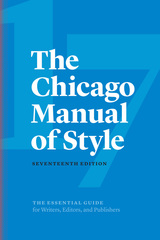
The Chicago Manual of Style, 17th Edition
The University of Chicago Press Editorial Staff
University of Chicago Press, 2017
Technologies may change, but the need for clear and accurate communication never goes out of style. That is why for more than one hundred years The Chicago Manual of Style has remained the definitive guide for anyone who works with words.
In the seven years since the previous edition debuted, we have seen an extraordinary evolution in the way we create and share knowledge. This seventeenth edition of The Chicago Manual of Style has been prepared with an eye toward how we find, create, and cite information that readers are as likely to access from their pockets as from a bookshelf. It offers updated guidelines on electronic workflows and publication formats, tools for PDF annotation and citation management, web accessibility standards, and effective use of metadata, abstracts, and keywords. It recognizes the needs of those who are self-publishing or following open access or Creative Commons publishing models. The citation chapters reflect the ever-expanding universe of electronic sources—including social media posts and comments, private messages, and app content—and also offer updated guidelines on such issues as DOIs, time stamps, and e-book locators.
Other improvements are independent of technological change. The chapter on grammar and usage includes an expanded glossary of problematic words and phrases and a new section on syntax as well as updated guidance on gender-neutral pronouns and bias-free language. Key sections on punctuation and basic citation style have been reorganized and clarified. To facilitate navigation, headings and paragraph titles have been revised and clarified throughout. And the bibliography has been updated and expanded to include the latest and best resources available.
This edition continues to reflect expert insights gathered from Chicago’s own staff and from an advisory board of publishing experts from across the profession. It also includes suggestions inspired by emails, calls, and even tweets from readers. No matter how much the means of communication change, The Chicago Manual of Style remains the ultimate resource for those who care about getting the details right.
In the seven years since the previous edition debuted, we have seen an extraordinary evolution in the way we create and share knowledge. This seventeenth edition of The Chicago Manual of Style has been prepared with an eye toward how we find, create, and cite information that readers are as likely to access from their pockets as from a bookshelf. It offers updated guidelines on electronic workflows and publication formats, tools for PDF annotation and citation management, web accessibility standards, and effective use of metadata, abstracts, and keywords. It recognizes the needs of those who are self-publishing or following open access or Creative Commons publishing models. The citation chapters reflect the ever-expanding universe of electronic sources—including social media posts and comments, private messages, and app content—and also offer updated guidelines on such issues as DOIs, time stamps, and e-book locators.
Other improvements are independent of technological change. The chapter on grammar and usage includes an expanded glossary of problematic words and phrases and a new section on syntax as well as updated guidance on gender-neutral pronouns and bias-free language. Key sections on punctuation and basic citation style have been reorganized and clarified. To facilitate navigation, headings and paragraph titles have been revised and clarified throughout. And the bibliography has been updated and expanded to include the latest and best resources available.
This edition continues to reflect expert insights gathered from Chicago’s own staff and from an advisory board of publishing experts from across the profession. It also includes suggestions inspired by emails, calls, and even tweets from readers. No matter how much the means of communication change, The Chicago Manual of Style remains the ultimate resource for those who care about getting the details right.
[more]
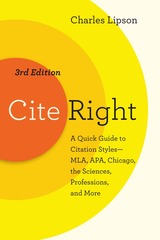
Cite Right, Third Edition
A Quick Guide to Citation Styles--MLA, APA, Chicago, the Sciences, Professions, and More
Charles Lipson
University of Chicago Press, 2018
Cite Right is the perfect guide for anyone who needs to learn a new citation style or who needs an easy reference to Chicago, MLA, APA, AMA, and other styles. Each chapter serves as a quick guide that introduces the basics of a style, explains who might use it, and then presents an abundance of examples. This edition includes updates reflecting the most recent editions of The Chicago Manual of Style and the MLA Handbook. With this book, students and researchers can move smoothly among styles with the confidence they are getting it right.
[more]
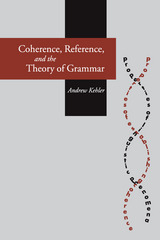
Coherence, Reference, and the Theory of Grammar
Andrew Kehler
CSLI, 2001
A natural language discourse is more than an arbitrary sequence of utterances; a discourse exhibits coherence. Despite its centrality to discourse interpretation, coherence rarely plays a role in theories of linguistic phenomena that apply across utterances.
In this book, Andrew Kehler provides an analysis of coherence relationships between utterances that is rooted in three types of 'connection among ideas' first articulated by the philosopher David Hume—Resemblance, Cause or Effect, and Contiguity. Kehler then shows how these relationships affect the distribution of a variety of linguistic phenomena, including verb phrase ellipsis, gapping, extraction from coordinate structures, tense, and pronominal reference. In each of these areas, Kehler demonstrates how the constraints imposed by linguistic form interact with those imposed by the process of establishing coherence to explain data that has eluded previous analyses. his book will be of interest to researchers from the broad spectrum of disciplines from which discourse is studied, as well as those working in syntax, semantics, computational linguistics, psycholinguistics, and philosophy of language.
In this book, Andrew Kehler provides an analysis of coherence relationships between utterances that is rooted in three types of 'connection among ideas' first articulated by the philosopher David Hume—Resemblance, Cause or Effect, and Contiguity. Kehler then shows how these relationships affect the distribution of a variety of linguistic phenomena, including verb phrase ellipsis, gapping, extraction from coordinate structures, tense, and pronominal reference. In each of these areas, Kehler demonstrates how the constraints imposed by linguistic form interact with those imposed by the process of establishing coherence to explain data that has eluded previous analyses. his book will be of interest to researchers from the broad spectrum of disciplines from which discourse is studied, as well as those working in syntax, semantics, computational linguistics, psycholinguistics, and philosophy of language.
[more]
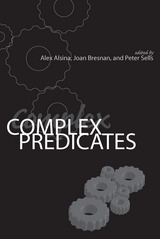
Complex Predicates
Edited by Alex Alsina, Joan Bresnan, and Peter Sells
CSLI, 1996
Complex predicates can be defined as predicates which are composed of more than one grammatical element (either morphemes or words), each of which contributes a non-trivial part of the information of the complex predicate. The papers collected in this volume, which were presented at a workshop at Stanford in 1993, represent a variety of approaches to the question of the range and nature of complex predicates, and draw on data from a wide spectrum of languages. This collection develops a better understanding of the range of phenomena that a general theory of complex predicates would have to account for, and to see what kinds of linguistic ideas and methodologies would be necessary for such a task.
[more]
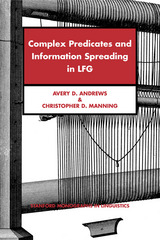
Complex Predicates and Information Spreading in LFG
Avery D. Andrews and Christopher D. Manning
CSLI, 1999
This book provides a simple but precise framework for describing complex predicates and related constructions, and applies it principally to the analysis of complex predicates in Romance, and certain serial verb constructions in Tariana and Miskitu. The authors argue for replacing the projection architecture of LFG with a notion of differential information spreading within a unified feature structure. Another important feature is the use of the conception of argument-structure in Chris Manning's Ergativity to facilitate the description of how complex predicates are assembled. In both of these aspects the result is a framework that preserves the descriptive parsimony of LFG while taking on key ideas from HPSG.
[more]
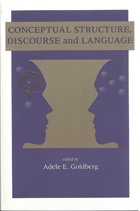
Conceptual Structure, Discourse and Language
Edited by Adele Goldberg
CSLI, 1996
This collection of papers is the outcome of the first Conceptual Structure, Discourse and Language conference (CSDL) held at the University of Califronia, San Diego in October 1995. CSDL was organized with the intention of bringing together researchers from both "cognitive" and "functional" approaches to linguistics. The papers in this volume span a variety of topics, but there is a common thread running through them: the claim that semantics and discourse properties are fundamental to our understanding of language.
[more]
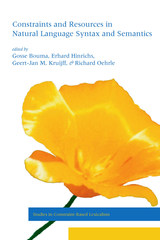
Constraints and Resources in Natural Language Syntax and Semantics
Edited by Gosse Bouma, Erhard Hinrichs, Geert-Jan M. Kruijff, and Richard Oehrle
CSLI, 1999
This collection draws together recent work on constraint-based and resource-sensitive approaches to the grammar of natural languages. Some of the issues addressed are: extraction phenomena in a range of languages, the syntax of nominal phrases, the role of argument structure, defining the interface between syntax and morphology and between semantics and prosody, quantifier scope, remnant movement, construction grammar, and formal and computational aspects of grammar formalisms. This volume brings together the leading linguists, logicians, and computer scientists working on Head-driven Phrase Structure Grammar and Categorial Grammar. Derived from two recent conferences on Formal Grammar and Head-driven Phrase Structure Grammar in Aix (1997) and Saarbrücken (1998), this volume represents the most current work in these frameworks.
[more]
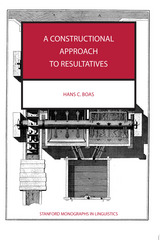
A Constructional Approach to Resultatives
Hans C. Boas
CSLI, 2003
Providing a unified solution within the frameworks of Construction Grammar and Frame Semantics, Hans Boas develops an account of resultative constructions in English by grouping them in two classes: conventionalized and non-conventionalized. The usage-based model used here proposes that each particular sense of a verb constitutes a conventionalized mini-construction, which is crucial information for the licensing of arguments. In contrast, verbs in non-conventionalized resultative constructions can acquire a novel meaning and thereby a new syntactic frame. English and German resultatives are compared to illustrate the distinct lexical polysemy networks of English and German verbs.
[more]
READERS
Browse our collection.
PUBLISHERS
See BiblioVault's publisher services.
STUDENT SERVICES
Files for college accessibility offices.
UChicago Accessibility Resources
home | accessibility | search | about | contact us
BiblioVault ® 2001 - 2024
The University of Chicago Press


